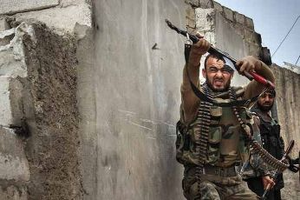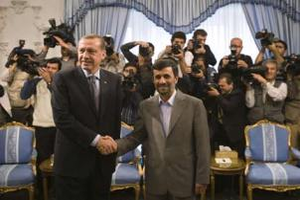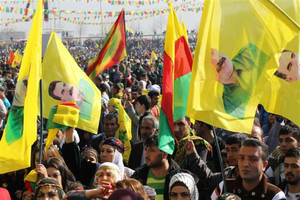The Arab-Kurdish Battle in Syria: Implications for Turkey's Standing
by Veysel Ayhan (vol. 6, no. 4 of the Turkey Analyst)
The battle over the Syrian town Ras al-Ain on the border to Turkey and the recent cease-fire agreement between the Syrian opposition and the Kurdish Democratic Union party (PYD) have major implications for Turkey, affecting its relations with the Kurds in Syria, and with parts of the opposition. The battle over Ras al-Ain has not only resulted in the Kurds seeing Turkey as their enemy, but has also led some Syrian opposition leaders to question the role that Turkey plays in their country. The standing of Turkey has been negatively affected as the notion that Turkey could be of assistance in ending the intensified ethnic, religious or sectarian strife that can be expected after the downfall of al-Assad has been dealt a blow at Ras al-Ain.

Turkey and Tehran: A Cold Peace
by Richard Weits (vol. 6, no. 3 of the Turkey Analyst)
Turkey and Iran continue to resist the strong trends driving them to renew their Cold War of previous decades. Thus far, Turkey and Iran have been able to cooperate on some issues even while they conflict on others. Though they engage in a proxy war in Syria and fight over NATO’s missile defense policies, Turkey and Iran have developed perhaps their closest economic ties in modern history, with Western sanctions squeezing out competitors and allowing Turkey to finally achieve a trade surplus when dealing with Iran after years of massive deficits.

The AKP's New Dialogue with Öcalan: A Process but Which Process?
by Gareth H. Jenkins (vol. 6, no. 1 of the Turkey Analyst)
On January 9, 2013, three female Kurdish nationalist activists affiliated with the Kurdistan Workers’ Party (PKK) were assassinated execution-style in the heart of Paris. They included Sakine Cansız, the doyenne of the Kurdish women’s movement and one of the original founders of the PKK. On December 28, 2012, Turkish Prime Minister Recep Tayyip Erdoğan had announced the beginning of a new dialogue with imprisoned PKK leader Abdullah Öcalan to try to put an end to the PKK’s 28 year-old insurgency. The timing of the Paris killings has meant that they have been interpreted as being linked to the dialogue; with Kurdish nationalists and Turkish government supporters each effectively accusing elements within the other of responsibility. Although both sides have called for the dialogue with Öcalan to continue, many Kurdish nationalists have serious doubts about the Turkish government’s sincerity, suspecting that Erdoğan’s main aim is to weaken and marginalize the PKK rather than address the underlying grievances that fuel its insurgency.
U.S. Intelligence Writes Turkey's Future
by Richard Weitz (vol. 6, no. 1 of the Turkey Analyst)
Whether within a NATO context, acting in parallel with the United States, or as an autonomous actor, Turkey’s importance to U.S. strategy will likely continue to grow in coming years. Turkey has already become a much more prominent global actor backstopped by a dynamic diplomacy, one of the world’s most energetic economies, and a turbulent neighborhood whose security vacuum propels Turkish involvement. Turkey’s rapid economic growth is facilitating the modernization of the Turkish armed forces and the country’s domestic defense industry. Turkey is located astride multiple global hotspots in the Balkans, the Caucasus, and the Middle East. With Europe’s possibly entering a period of prolonged stagnation and with U.S. attention drifting eastward, Turkey could become one of the most influential NATO countries.

What the Columnists Say
The reactions to the resumed talks between the Turkish government and Abdullah Öcalan, the imprisoned leader of the Kurdistan Workers’ Party (PKK), are generally cautious among the Turkish commentators. What is especially notable is that several of those Turkish commentators who have earned a name as experts on the Kurdish issue are particularly circumspect, expressing severe doubts about the prospects of the resumed peace process; notably, they question the motives of Prime Minister Recep Tayyip Erdoğan and point out that the Turkish government isn’t offering any comprehensive solution to the Kurdish question, only talking about disarming the PKK. Although that secures the consent of the Turkish majority to having talks with Öcalan, an agreement that disregards the Kurds’ demands will not be viable, they warn.








